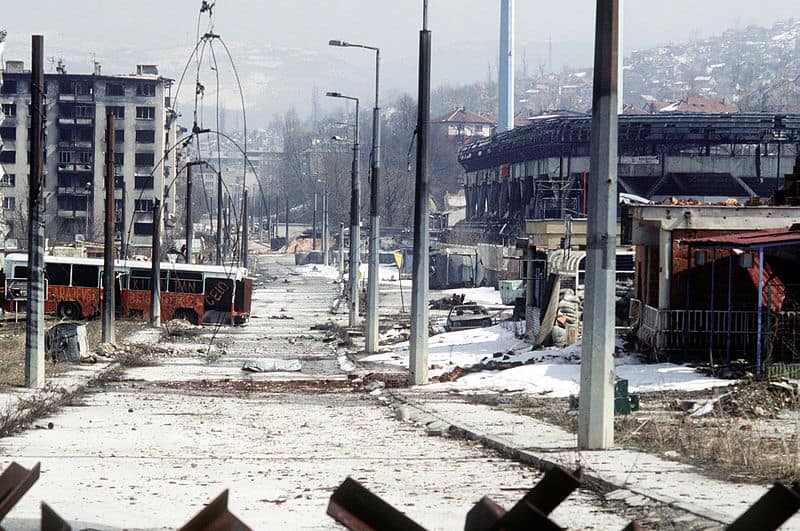What will happen when SHTF?
We can spend a lot of time speculating how people will react in the aftermath of a major disaster, how society will respond, what food will be available, and many other survival details. But the truth is that we don’t know what will happen when SHTF.
The best thing we can do is imagine as many possible scenarios as possible and take steps to prepare for them. However, we can learn from SHTF situations throughout history. By seeing past events, we can get an idea of what may come.
The Bosnian war of 1992 to 1996 is one of the most recent examples of a total SHTF situation. Upwards of 329,000 people died during the war, and the country is still recuperating in many ways (though it has also made a remarkable recovery). During the Siege of Sarajevo, which lasted 1,425 days, people were without water, electricity, and supplies.
Remember that Bosnia was a very Westernized, modern country when the war broke out. Heck, the capital of Sarajevo even hosted the 1984 Olympic games!
Don’t think that war or disaster couldn’t happen to you. It happened in Bosnia and could happen anywhere. Learn from their survival stories and be more prepared for SHTF.
Supplies Will Run Out. Skills Won’t.
One of the best real-life survival stories from the Bosnian War is One Year In Hell, published at Personal Liberty. The author gives a detailed account of how he and his family (most of them) survived the brutal war.
One thing in particular stands out:
“I was a paramedic. In these conditions, my knowledge was my wealth. Be curious and skilled. In these conditions, the ability to fix things is more valuable than gold. Items and supplies will inevitably run out, but your skills will keep you fed.”
It is fine to stockpile food and supplies for a disaster scenario, but in a real SHTF situation, those supplies will quickly run out (or be stolen).
The best thing you can do to prepare for SHTF is to learn valuable skills like how to make a generator, treat wounds, and make candles…
You Will Eat Anything
They say you can survive up to 30 days without food, but hunger will get the better of you long before then. When hunger sets in, you will eat anything.
Bosnian war survivors tell stories of eating pigeons and rats, stinging nettles, and other urban edible plants. When no food was available, they ate grass and leaves.
One of the most poignant stories of hunger that I read is from a girl named Maja, who was 16 when the Bosnian war broke out.
“As I walked into the apartment, I could smell the soup and bread, and my stomach grumbled. I knew that the soup was made from the last of the meat from my pet rabbit, but hunger knows no loyalty or sentiment.”
Dirty Water Will Kill You
You might be able to go for 30 days without eating, but you can only survive for about 3 days without water. During the Siege of Sarajevo, there was no working plumbing, which meant that people had to collect rainwater and risk sniper fire to fill water jugs at the river.
Understandably, people dying of thirst would gulp down the first bit of water they got – but many people died from diseases obtained from drinking dirty water. Know how to purify water in case SHTF.
You Will Be Bored Out of Your Mind
Bosnians spent much time during the war crouched down in basements and holed up in apartments. It is incredibly dull. Without anything to occupy their minds, fear would overwhelm them. No wonder survivors say that books became their only respite. I will add more books (the paper kind, not Kindle!) to my survival supplies.
Don’t Get Pregnant
This would seem obvious because who wants to worry about prenatal nutrition when you have nothing to eat? But a surprising number of women did get pregnant during the war.
It has to do with the last point. Think about it: You are bored out of your mind, trapped in your home, and there is no light. What do you think people did? Of course, a lot of women got pregnant!
You might want to stockpile some birth control pills and condoms in your survival supplies.
Get a Bike
Even if you had some precious gasoline, driving a car during the Bosnian war was a bad idea. The streets were so destroyed and full of wreckage that you couldn’t drive, and being in a car would make you a target. Instead, a bike was an excellent method of transportation. On a bike, you could navigate through the wreckage and go quickly, making you less likely to get hit by snipers.
The “Siege of Sarajevo” museum has a bike on display. This bike not only helped its owner survive sniper fire but also was used as a generator for radios and other electrical devices.
Live Near Reusable Resources
I reiterate: no matter how many supplies you’ve stockpiled, they will eventually run out during an SHTF situation. The best thing you can do to prepare is to live near reusable resources. This includes:
- Water source like a stream
- Yard for gardening
- Woods with trees for fuel
Even this isn’t necessarily going to save you. One Sarajevo siege survivor talked about the garden they made on their apartment balcony. They had to decide whether to eat the tomatoes while they were still young and small or wait for them to grow and risk having them stolen.
Also note that within 2 months, every tree in the city parks was cut down for fuel and warmth. The reusable resources around you will be in high demand, so don’t count on them being there for you. People tore up their floorboards to burn for heat!
You Will Get to Know Your Neighbors Better than Ever
I once met a Sarajevo war survivor who told me,
“You would have loved the war! We all worked together. We were all equals. When we made a pulley system in the elevator shaft to bring water to the upper apartments, we all got together and took a turn – even those who lived on the first floor.”
This statement seems unbelievable to anyone who hasn’t gone through a SHTF situation. But I’ve heard it echoed in other war survivor stories. For example, a man named Unka, who owns the Balkan Han hostel in Sarajevo, told a guest,
“The first year or so during the siege was actually a rather good time because he got to know his neighbors better than ever before and because they, being the crazy guys they were, made a good time of it despite the chaos – music and theater and moonshine abounded!”
Remember, there is strength in numbers! Talk to your neighbors about making a community disaster plan.
Don’t Count on the Authorities
The only person you can count on in a SHTF situation is yourself. Don’t count on authorities like the police or military to keep you safe.
Take what happened in Srebrenica as an example. It was a “UN Safe Haven” with Dutch troops stationed there.
Despite this, it became the site of the worst massacre of the war, and over 8,000 men and boys were rounded up and killed. The day that Srebrenica fell, 25 thousand refugees pleaded for help outside of the UN military base but were left outside to fend for themselves.
There is No Point in Fighting If You’ve Lost Your Humanity
Perhaps the most amazing stories from the Bosnian war are the ones about how people went on with their lives – despite the horror happening around them.
They made their own beer.
The moment the power or water was temporarily restored, the beauty parlors would be filled with women getting their hair done…
This might seem downright stupid. Why risk your life to go to a concert or waste supplies to get your hair done? But one war survivor had this to say of it:
“The feeling that you’re human can fade pretty fast. I can’t tell you how many people I knew who would have traded a much needed meal for just a little bit of toothpaste, rouge, soap or cologne. Not much point in fighting if you have to lose your humanity. These things are morale-builders like nothing else.”
What do you think is the most important survival skill for getting through a SHTF situation like war? Let us know in the comments.
Read the full article here





